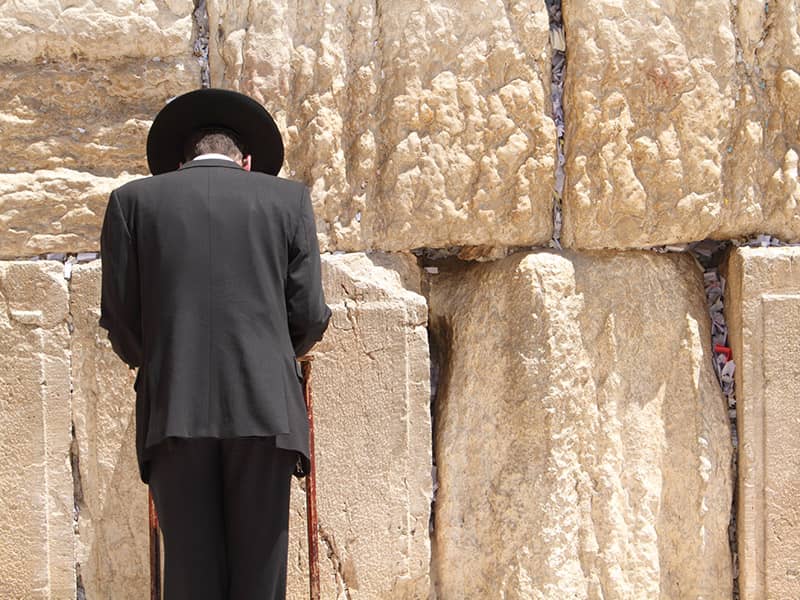That was not the way we imagined it not more than a year ago, when we began planning the last bat mitzvah. The last we were going to do, for our younger daughter. We had imagined sunshine. We had imagined the delightful sunny weather of New Orleans in November, with the days just right: crisp but not too hot.
Instead, we got the deluge. The Torah portion should have been Noah with his ark to survive the flood, but it was Vayera instead.
We are blessed with two daughters, born seven years apart. So the previous bat mitzvah had been at a different time in our lives, and even in history. There had been sunshine at that bat mitzvah, and after the beautiful Shabbat, with our family from all over still hanging out, we watched the handshake on the White House lawn--Clinton, Rabin, and Arafat signaling that peace might finally be at hand--and that felt like an extra blessing, the greatest bat mitzvah gift we could imagine.
Now, seven years later, there was no sunshine and there was no peace. And there weren't going to be any handshakes on the White House lawn. And as we sat up on the bimah (podium) in this beautiful domed synagogue on St. Charles Avenue, we wondered how we would recapture the beauty and magic of the last bat mitzvah.
Our daughter Kezia was used to beating the odds. She'd been born against the odds--in a hospital in this old city, where a few moments after her birth she'd ended up in the neonatal intensive care unit. Not long after that, as part of her treatment for a rare condition at birth, she'd been completely immobilized by a drug derived from curare.
For 10 days, she could not move, and a machine breathed oxygen into her body while we watched, praying and crying and holding her hand. And we sang to her, as I'd sung to her before she was even born, a little song of Shlomo Carlebach's: Haneshama lach, v'haguf... "The soul is Yours, the body is Yours, have mercy on Your handiwork."
And now look at her. Robust and so alive, dark-haired beauty, full of poise, leading the prayers, commanding the congregation to stand and sit like a seasoned rabbi. A small figure in this grand pulpit of hand-carved wood and marble, she is fully in charge and the center of attention to friends and family--true foul-weather friends and family who braved the worst weather New Orleans could throw at them to arrive--even to arrive on time.
Kezia is a seasoned performer, a quiet perfectionist who studies hard and works hard and has been active in theater. A year before, having completed the highest levels of our local after-school Hebrew school, I asked her if she'd like to study one-on-one with a tutor. To my delight, she said yes. And so for a year, a young rabbi-to-be came to our house every week, and they spent an hour at our dining room table, piled up with editions of Chumash (Torah) and Rashi (the preeminent commentator), Hebrew dictionaries and a grammar, going over the story of Abraham word by word. She didn't need to do any of this for her bat mitzvah; she did it because she genuinely wanted to learn.
At a certain point in the bat mitzvah service, my heart lifted and the sun shined. Not outside, of course, where the dreadful rain hammered and battered the streets, and the wind whipped and howled. But inside, my heart lifted, all our hearts lifted.
I know exactly when it was. It began when we passed the Torah from one generation to the next, until my wife put it into Kezia's arms, and our daughter rested it against her shoulder.
You see, it's not the pulpit, it's not the guests, it's not the beautiful dome; it's not even the velvet dress of the Torah or the Torah's silver crowns that matter. And it's certainly not the weather, not the party or the gifts or any of that excitement. No; in the end this is what a bat mitzvah is about: It is about this child who is becoming a woman standing in front of this ancient text and giving it voice, giving it her sweet voice--chanting it into the air.
This Torah is not the parchment and it's not the ink; it is the breath of knowing--the breath of wisdom--sung in an ancient tune, here in New Orleans, and there in Jerusalem, and up there in Baltimore, and probably somewhere in Hong Kong, all at once, sung, chanted, recited, intoned, given to the air to become part of all its listeners and connecting all of us.
And there's something else, I think, especially for young women. The bat mitzvah comes at that awkward stage in life, when young girls are getting self-conscious about their bodies. In our culture, so much emphasis is on the exterior, the physical, the appearance; but here in the synagogue, at that moment, all the emphasis was on the interior, the intelligence and the soul. What a wonderful, powerful reflection of Kezia's soul in this deep shining text, the great poem of our people and mirror of our wisdom.
I bless Rabbi Mordecai Kaplan who created the bat mitzvah in 1922 and showed us that Judaism can change and reflect how we understand the lives of women today. And I bless my daughter Kezia, who lifted our hearts and showed us once again the ancient but always new light hidden in the Torah, which brightens even the stormiest day.

